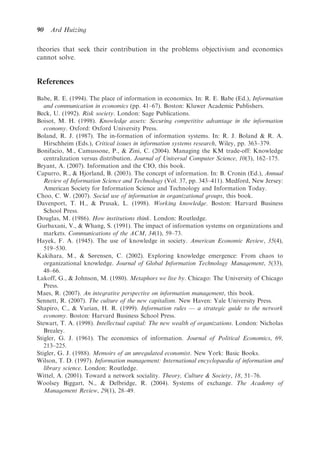This chapter discusses how information management has been strongly influenced by the philosophical tradition of objectivism. Objectivism views the world as consisting of distinct objects that exist independently of human cognition and can be studied to gain objective knowledge. It has shaped key definitions and goals in information management, such as defining information and knowledge as granules that represent objective realities. Information management also shows influence from microeconomics, viewing information exchange as a market and aiming to maximize participation and competition. However, the chapter argues that objectivism may not provide the best foundation for information management, as it cannot adequately deal with the subjective nature of information.
![Chapter 6
Objectivist by Default: Why Information
Management Needs a New Foundation
Ard Huizing
ABSTRACT
In this chapter, I illustrate how closely information management is rooted in the
philosophical tradition of objectivism. I then address my second goal, which is to
probe the question of whether or not objectivism provides a sound and solid foun-
dation for information management. With these goals in mind, I first explain what
objectivism is, for which I extend this philosophical tradition with microeconom-
ics, one of its most influential elaborations. I subsequently illustrate how deeply
information management and the adjacent field of knowledge management have
been affected by objectivist thinking. Objectivism has determined the domain,
rationale, definition and goal that are commonly ascribed to information and
knowledge management as well as the definitions of their core concepts informa-
tion, knowledge, communication and learning. Moreover, information and knowl-
edge management show a deep appreciation for the market form of organizing, as
suggested by microeconomics. Being an influential theory means that the under-
lying theoretical assumptions get internalized into people’s belief systems, which
can then become an established ideology. As a result, these assumptions help
frame what the organizational challenges are and how to manage them. Sum-
marizing this chapter, Table 6.1 includes the objectivist and related economic
assumptions upon which information management has been built. Finally, I return
to the foundation question. With objectivist economics, information management
has chosen a theoretical basis that has ironically proven to be incapable of dealing
with the very core of its existence: information. Stigler’s (1961) observation still
applies: ‘‘[Information] occupies a slum dwelling in the town of economics’’ (in
Babe, 1994, p. 49). Objectivism and economics are and will remain helpful in
information management, but need to be complemented by subjectivist theories
that seek their contribution in the problems objectivism and economics cannot
solve.
Information Management: Setting the Scene
Copyright r 2007 by Elsevier Ltd.
All rights of reproduction in any form reserved.
ISBN: 978-0-08-046326-1](https://image.slidesharecdn.com/chapter6huizing-101017061747-phpapp01/75/Chapter6-huizing-1-2048.jpg)
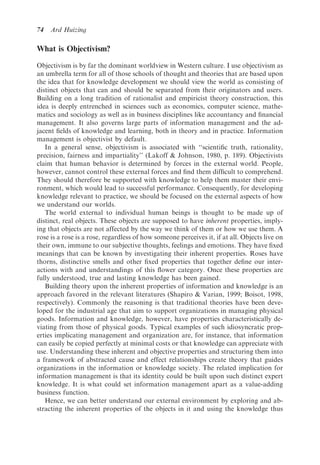
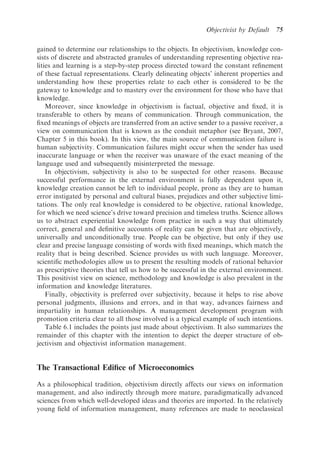
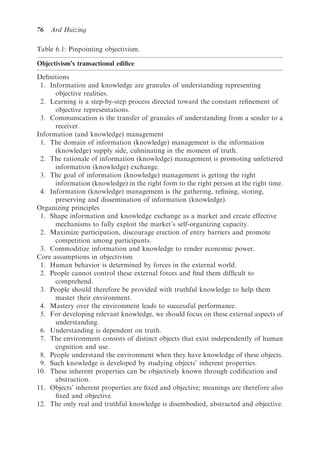
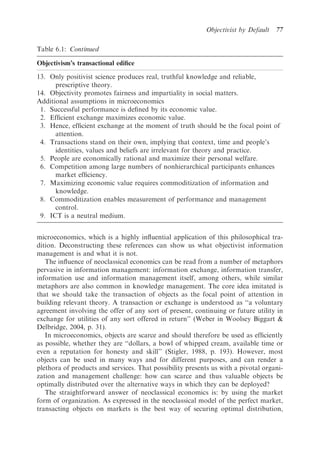
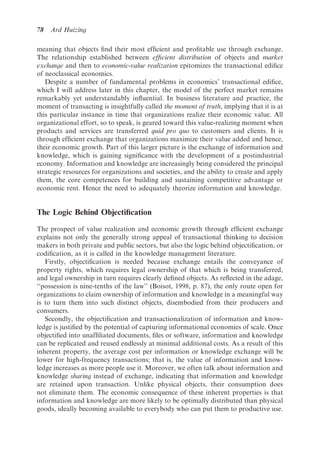
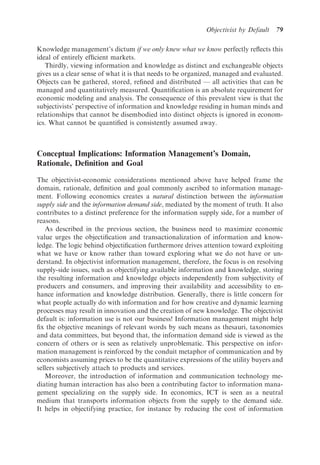
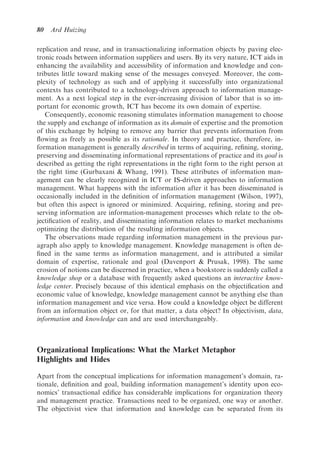
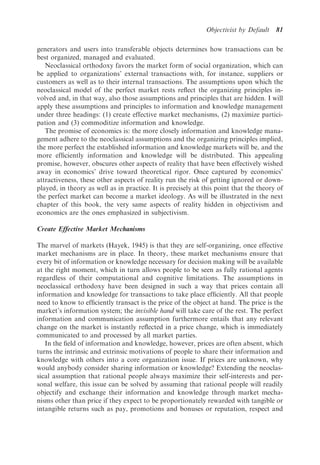
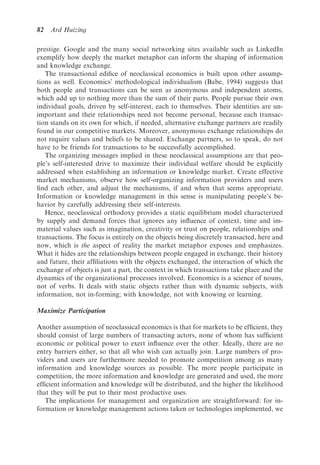
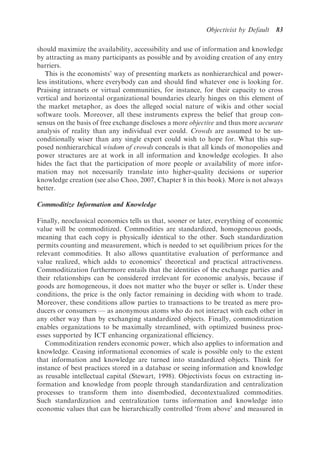
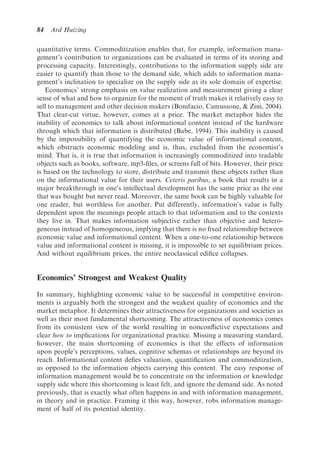
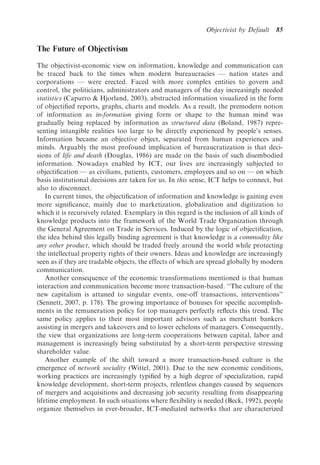
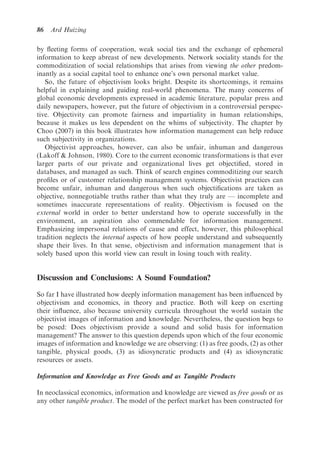
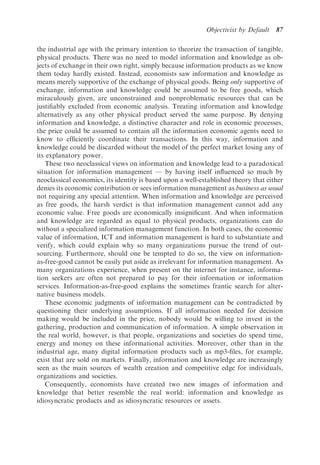
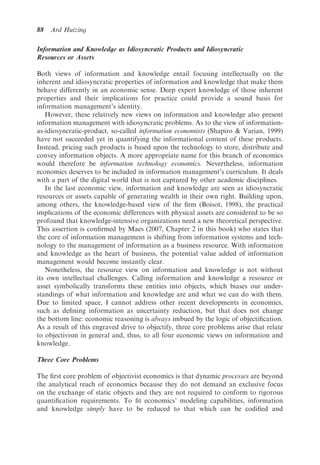
![Objectivist by Default 89
commoditized, complex human communication and interaction to discrete, one-off
transactions, and learning to the passive consumption of factual representations. As
a result, economics is helpful in clarifying that knowledge needs to be codified in
tradable objects to extract and protect its economic value. It is, however, not helpful
in gaining understanding of how people and organizations use and create informa-
tion and knowledge to shape their everyday life (Kakihara & Sørensen, 2002).
Moreover, economics contributes to an artificial and confusing divide between in-
formation supply and demand, stressing the first and largely ignoring the latter.
Could this divide help explain that so many of us seem to believe that once infor-
mation has been delivered, it has also been consumed?
Secondly, the emphasis in objectivism on discovering universal truths precludes
context as a factor important to economics. Once again, information poses insur-
mountable problems. Economic, not sociological, reasoning is as follows (Babe,
1994). When all suppliers charge the same price for the same good, the price is less
informative for buyers than when it is sold at different prices. Hence, the value or
meaning of information, here the price, is context-dependent, much to the dismay of
mainstream economists.
Thirdly, truth and meanings are relative not only to context, but also to people’s
mental frameworks or conceptual systems of how the world works. For both reasons,
human beings cannot act differently than to impute their own meanings to infor-
mation. Hence, it is also possible that different people attach divergent interpretations
to the same information or that the same person interprets the same information
differently when faced with a different context. Economists cannot deal with such
divergent sense making behavior. Information is supposed to help bring supply and
demand together in an equilibrium price. For information to have such equilibrating
effects, however, all economic agents have to interpret it in the same direction
(Boisot, 1998). Without this crucial assumption, information would become an
unpredictable phenomenon that cannot be analyzed or even observed a priori, which
would cause the neoclassical edifice to fall apart. With this assumption, however,
economists exclude a major source of learning and innovation. Once again, relevance
is sacrificed for rigor.
Conclusions
In summary, no matter how much progress has been made ever since, Stigler’s
(1961) remark still applies: ‘‘[Information] occupies a slum dwelling in the town of
economics’’ (in Babe, 1994, p. 49). One conclusion is that the so-called information
or knowledge economy still misses one of its critical cornerstones — an economic
theory of information, knowledge and learning. Another — ironic — conclusion is
that information management with its choice for objectivism and microeconomics as
its foundation has precisely selected a philosophy and theory that are incapable of
justifying and grounding the very heart of its existence: information. This conclusion
also means that an integrative approach to information management should entail
more or something different than ‘‘the management of information as a business
resource’’ (Maes, 2007). In the next chapter, I will look for inspiration in subjectivist](https://image.slidesharecdn.com/chapter6huizing-101017061747-phpapp01/85/Chapter6-huizing-17-320.jpg)
